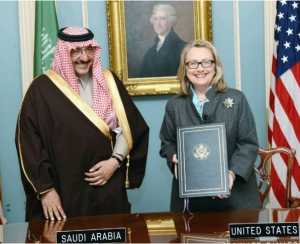Why Is State Waiting to Release the Saudi Technical Cooperation Agreement?
 As I noted in this post, one explicit purpose of Saudi Minister of Interior Mohammed bin Nayef’s trip to the US from January 14 to 16 was to renew the Technical Cooperation Agreement first signed on May 16, 2008 by Condi Rice and MbN’s father when he was Interior Minister. MbN and Hillary Clinton signed the renewal on January 16.
As I noted in this post, one explicit purpose of Saudi Minister of Interior Mohammed bin Nayef’s trip to the US from January 14 to 16 was to renew the Technical Cooperation Agreement first signed on May 16, 2008 by Condi Rice and MbN’s father when he was Interior Minister. MbN and Hillary Clinton signed the renewal on January 16.
Particularly given that the prior TCA is posted on State’s website and this picture was out there (not to mention the joint statement with DHS, addressing a trusted traveler program that may end up being controversial), I was surprised that the renewal was not. I checked with State and–after a day of checking–learned that the renewed agreement “hasn’t been posted yet.”
Yes, I do plan to keep trying, both through persistence or FOIA.
But I am interested in why State wouldn’t post it right away. Perhaps it’s just internal bureaucracy, but here are thoughts about some other possibilities.
State could be hiding changes in the funding structure
First, there is a change we know has taken place since the TCA was first signed.
The TCA is basically a cooperation agreement to get direct help from us–including training and toys–to protect Saudi infrastructure and borders, particularly its oil infrastructure. As part of it, the Saudis are developing a 35,000 person force, including a paramilitary force, with US training. But unlike our other defense agreements with the Saudis (and like the Joint Commission for Economic Cooperation it was explicitly modeled on, which had been in place from the 1970s until 1999), this one includes a special bank account to fund it all.
The Kingdom of Saudi Arabia will establish a dollar disbursement account in the United States Treasury. Any funds required by the United States for agreed-upon projects will be deposited by the Kingdom of Saudi Arabia in the account in such amounts and at such times as are mutually agreed, and the United States may draw on this account in the amount so agreed. If upon termination of this agreement there are funds remaining in the special account after all expenses have been paid, such funds will be refunded to the Kingdom of Saudi Arabia.
That account could fund contractors and toys. But at least at first, it could not fund US government employees.
The United States will pay for all costs of U.S. Government direct-hire employees assigned to the Kingdom of Saudi Arabia to perform services under this Agreement.
Less than a year into the agreement, that changed, with MbN agreeing the Saudis would also pay for US personnel salaries.
MbN was grateful for USG efforts and assured us full funding would soon follow the signing of these documents, and reconfirmed the SAG’s commitment to pay all OPM-MOI costs. He also agreed to fund all USG employee costs, concurring with any necessary TCA changes to allow such payments, commenting that “hopefully the lawyers will not cause us any problems.”
And already by the time MbN made that agreement, the US was installing military and State employees to oversee this effort (see more on these personnel here).
Now, I’m not entirely sure how innovative it is that the Saudis are funding US hires to defend their oil infrastructure. But MbN’s quip about the lawyers suggests some sensitivity on this front. Read more →
